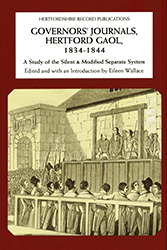
Volume XXXV, Governors’ Journals, Hertford Gaol, 1834-1844, edited by Eileen Wallace
We know a great deal about life in Hertford gaol because, under the Prisons Act of 1823, governors had to keep a journal of punishments meted out and any other important occurrences within the gaol. Volume XXXV is an edition of the first two surviving volumes (1834 to 1844) of the Hertford Governors’ Journals. These give a graphic picture of life within the gaol for inmates and staff alike. They illustrate the struggles of inmates to survive under such harsh conditions and of staff to keep order whilst trying some small and not very successful measures of rehabilitation, mainly through the efforts of the chaplain. The following examples give a flavour of the entries.
On 28 April 1838 James Bacon was given 30 lashes but Edward Harris only 24 ‘because he was of a weak disposition’. On 18 April 1840 Emma Bygrave was sentenced to two days in a solitary cell for singing in the gaol and on 13 September 1842 James Neeson was also sentenced to two days in a solitary cell for repeatedly laughing. A boy, John Scales, pulled nails from his cell window and received three days in solitary on bread and water in 1836. He was called a hardened and mischievous lad. These harsh punishments were thought necessary because by the 1830s Hertford gaol contained a large number of disaffected, and sometimes violent, people because terms of imprisonment with hard labour had replaced the public and brutal punishments of an earlier era such as the pillory, stocks and branding.
Hard labour within the gaol took the form of up to 9 hours a day on the tread wheel. The prisoners hated this and some harmed themselves to try to avoid it. The crank was later introduced which consisted of a handle which prisoners had to turn many times in a day. It could be screwed tighter to make it harder to turn so the turnkey who controlled the mechanism was often called a screw. Women and old and feeble men had to pick oakum, teasing out strands of old rope until their fingers bled. Prisoners were forbidden to talk to each other or make any other noise and were expected to look straight ahead.
Hanging was now reserved for murder and treason but still took place in public and was a popular spectacle. Thomas Cook even ran excursion trains to witness it. Transportation continued and about 520 people from Hertfordshire left for Australia between 1834 and 1844, the youngest being a boy of 9 years old.
This is the Hertfordshire Record Society’s volume for 2019/20.
- Edited and with an Introduction by Eileen Wallace
- xcv + 393 pages
- 10 illustrations, 1 map, 1 plan of the gaol, plus illustrated jacket
- ISBN 978-0-9501741-4-3
Non-Members:
£22
• Members:
£17.50
(+£4 p&p )